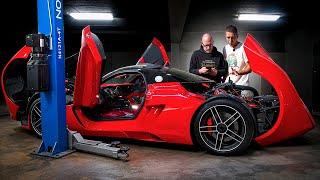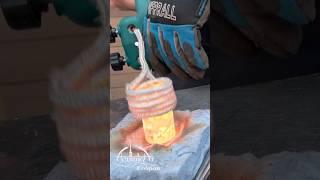
Revolutionary Paint: How to Make Surfaces Stay Cool in the Sun
Комментарии:

Is there an application for this coating to provide a good reflective surface for bifacial solar panels to receive more solar energy to their undersides?
Ответить
Good video. Very interesting. However, I think that you should have used a mirror instead of the aluminum plate. It did not look like your aluminum plate was very reflective (not polished). Also, if you seal the edges up, a mirror should be pretty durable outside.
Ответить
can you cover this paint with a clear coat without reducing the efficacy?
Ответить
Lol. He said it’s pretty easy to make 😂. Don’t have the equipment, time, or patience. Wish there was an easier way for average me to do it. I live in the desert near Death Valley 😢
Ответить
Really a great video (and a great channel too, I just discovered it), thanks!
I was wandering if anyone knows if this coating is available commercially? I really want to try it myself on my car!

I was wonder if there was such thing, would it stick to plastic though? I'm making a solar e-bike camp gear trailer, and I hate how hot my battery box can get in the sun. I also wonder why they make them out of black plastic and was going to just paint it white but if I can do better then that's better.
Ответить
This is awesome. I love this style of hardcore garage chemistry.
Ответить
Just pure fraud. The light reflection makes the temperature difference. More dark = warmer.
Ответить
This is a great idea and I wish I could afford all the things that you are using for your demonstration plus 48 beers necessary for such a complicated manufacturing process, it is impressive! However if I was not a budget I would just buy an efficient AC unit instead, yet I am on the budget, I live in Desert Hot Springs in CA on the farm and I would like to build a system that could cost less then the price of huge AC unit, be simple enough to be constructed with regular farm and DIY tools and did not require degree in physics and chemistry.
I have a small house, a green house and a workshop garage that needs to be cooled down, as of now I cool the house with AC unit that gets very expensive for daily use, I cool my small greenhouse with a swamp cooler but it works poorly in August due to the periodic humidity and I do not use a workshop/garage during summer as it is too hot. It would be really cool😅 if you could figure out how to build some kind of central cooling system that would be efficient enough to keep all my structures at no more then 80 degrees F. I admit I am not smart enough to come with my own idea but Im skillful to build a lot of things myself.
Only then I would be really impressed, the scientific approach is great but not practical and temperatures in my area are around 100 or above, 115F is frequent during the summer half of the year so it is hot here. We have plenty of sunshine though. Can you think of some practical solutions so folks in hot climate could live more comfortable?
I will look at ways of supporting your channel regardless just because it’s interesting.
AM
DHS, CA

Excellent production in every respect. I learned a great deal. One question. It seems that a lot of time could be saved by casting the final mixture on the surface to the required thickness in one step. I assume that what you are after is to form a series of parallel planes of BaSO4 spheres, and casting would result in an random arrangement of spheres, that would not be as emissive. Or is it just because the solvent evaporates faster or more uniformly. Have you tried various application procedures ? Gerry Blodgett
Ответить
Any idea the outdoor life span for a layer of this? I'm not a painter and just curious the durability of a coating of this.
Ответить
Excellent!
Ответить
how would this paint work after it gets dusty?
Ответить
Talk nerdy to me Baby!
Ответить
Sir, I’ve had this idea for years.. but is there anyway to utilize paint as a Solar Cell? Even though the efficiency wouldn’t be the best it would be better than nothing. There is a lot of wasted space on modern structures, if all surfaces could be a PV Cell it would be better than nothing?
Ответить
You sparked a memory that I have three diffuse reflectors from a past experiment in my garage. They are samples from Lab Sphere called “Pemaflect®️. I was testing retroreflector for our laser measuring a few years ago. The goal was the find the reflector that worked best competing with fog. Anyhow, what you are demonstrating seems very similar to the coating that is applied on these plates “very expensive” but these are free samples. Anyhow going to get out my Flir and do a couple tests.
Ответить
You guys are deceptively funny. This tech is really cool too
Ответить
wow!! keep it going!!
Ответить
I love that guy. 😂
Ответить
can't we use some kind of film like one way mirror, that will reflect sunlight, but pass IR light from your plate? maybe we have some material like this in the wild:)
Ответить
Wow! Very exciting. I live a hot climate where summer temperatures reach 45 C.
I was wondering would the effect of paint still be true if I paint ceramic tiles (or any other material) instead of aluminum?

Walter White in an alternate universe where he never broke bad.
Ответить
Can I use a 50 mm stirring bar for 1 ton of that powder? 🤔
Ответить
Your committing is mind blowing. 🙏🏻🙏🏻
Ответить
Practical question. In japan, where winter is cold and summer is sweltering, how can I use this without freezing in the winter?
Ответить
New whitest white? 😅
Ответить
In temperate climates since it is costlier to heat a house than to cool a house, it may be smarter to cover a house with darker colors, though more reflective paints will still outlast dark colors saving in maintenance costs; so hmmm?
Ответить
how does the panel perform at night?
Ответить
Awesome, i have two questions, I might have missed the answers. If put in a roof how long would it last? Also, could it be clear coated to protect it?
Ответить
But in the winter we need it to be warm
Ответить
I made this with barium nitrate! 2:2:1:2 with barium nitrate:edta:drain cleaner:sodium sulfate!
I tested it and the byproduct is pure sodium nitrate and makes the plants in my garden really happy!
The PH matters, like you said in the video, and I've found that a ph of about 6.2 makes the best size particles!

Jordan schlanskies dad
Ответить
Walter White here is way more interesting than watching any cooking show.
Ответить
This guy is Breaking Bad. Is this similar to what's used to make the nano-ceramic window tint? I bought some for my home windows in Florida (slight tint) and measured it with a light transmission meter and got 91% IR rejection to try to cut down the heat coming in. Only problem is that I think much of the heat gets reflected into the window glass causing it to get to about 125 deg F on the inside surface. I may have just traded one problem for another.
Ответить
It would be interesting to see what the effect it would have on the electric usage of a a house painted with this from the ground up. Including the roof. Cool stuff!
Ответить
How does temperature effects pratical size ?
Ответить
So lets say, I coated the inside of a tube using some barium crystal.
The transference of light is obviously diffuse.
How would i calculate how much light would i be getting out the other end based on distance and bends with certain angles?
If i was not at all interested in being able to see the other end, how much more light would i be able to get by covering the tube in the stuff instead of having just a 45degree mirror?
How could i get such equations?
You said its cheap stuff, i have a personal usecase!
Does this coating degrade?
By how much and how long would it take? Could you but this in the form of a premade film that i can easily replace in such tube instead of having to paint it again or getting a new tube?
What is the reflectivity outside of the visible spectrum? UVA? B? C?
Sorry if you mention some of these things but im like 5 minutes in and i got excited, this may change a project plan completely making it much more effective and take less space.

Does the stinky solvent stick around in your house?
Ответить
Hi Tech Ingredients
I love your content of your videos and specifically this topic - I have been looking for a while passive ways to reduce the electrical bill in my house
and I your paint looks great...
I was thinking to use your paint to paint the roof of my house using your method - The roof is cover with a membrane with a surface similar to shingles
I believe even if the paint last only 3 or 4 years is worthy.
I seeing this video multiple times to gather as much information I can. I notice you provided good information about some of the ingredients but not all
If you can recommend a source to buy: dimethylformamide, sodium sulfate, barium chloride, etching primer for metals and any other necessary info to buy the proper product will be helpful.
Does the roof membrane will require any primer etching like the aluminum sheet prior to apply the paint?
You recommended two places to buy Poly(methyl methacrylate) and two places to buy barium sulfate - Great Thank you...
Another question - My roof is 30 feet's by 15 feet's
Can you please provide a rough estimate of how much product I will need in order to do 25 passes of paint... (grams or kilograms) or maybe 1 square foot so I can escalate...
Thank you again for all your work on this and keep us informed

Love your work. Thanks from the Philippines, this paint can relay make a difference in this area. Wondering about the decay over time? Anyway, thanks for this and other videos you done so far, grate work!
Ответить
Wait, if you are in New England, why does your equipment have C instead of F? I thought you were in Canada or real England.
Ответить
For determining the radiate discharge the surrounding temperature is important. If you have it in a structure that held a vacuum would it significantly change the output? Did not say it would be practical just wondering (optical NaCl is transparent to FIR I believe).
If the effective temperature difference between the object and its surroundings is negative, the system would not achieve a cooling effect. For example, with the radiating object at 60°F, a surrounding temperature of 50°F, and an emissivity of 0.9, achieving 10,000 BTUs of cooling (or 2,930.83 watts) would require approximately 91.54 square meters of surface area. However, if the effective surrounding temperature were lowered to 0 K, only 8.14 square meters of surface area would be needed to achieve the same cooling effect.

FUKKKKLL, JUST TELL ME THE PRODUCT AND NOT WASTE AN HOUR OF MY LIFE WITH BULLSHTT..........🎉🎉🎉
Ответить
Really excellent job! Great to see this method with the microspheres taken to what I think is probably its full potential, and in a way that's totally doable outside of a lab. It's also very impressive to achieve sub ambient temps without any sort of film or insulation. It must be radiating a fair amount of w/m^2 to overcome the breeze blowing over it. Very well done, and it was especially useful to include info about bulk suppliers.
I'm still working on new methods myself. I'll be thrilled if I can hit similar numbers as you have.






![[2024 K리그1] 27R 전북 vs 포항 풀 하이라이트 [2024 K리그1] 27R 전북 vs 포항 풀 하이라이트](https://hdtube.cc/img/upload/RWpMM3pyMGpRbm0.jpg)



















